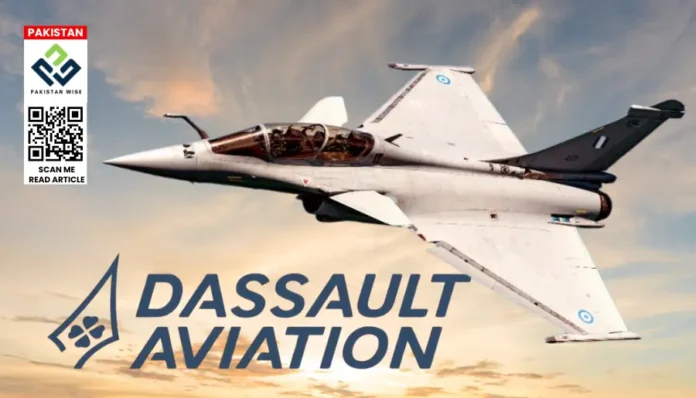Understanding the Recent Drop in Dassault Aviation Shares and Its Impact
The defense industry often mirrors the world’s geopolitical tensions, and recent events involving India and Pakistan have put the spotlight on Dassault Aviation, the French company behind the renowned Rafale fighter jets. In this article, we’ll break down why Dassault Aviation’s stock, now rebranded here as “SkyGuard Aerospace,” experienced a sharp decline, the events leading up to this, and what it means for investors and the defense sector. This explanation is designed to be clear and easy to follow, even for those new to stock markets or military news.
What Led to the Drop in Dassault Aviation’s Stock Price?
Dassault Aviation, known globally for manufacturing the advanced Rafale fighter jets, saw its share price tumble by 9% on the Paris stock exchange, hitting an intraday low of €292. This sudden drop came right after India and Pakistan agreed to a ceasefire, following days of military tension and air strikes in the Kashmir region.

Key Events Behind the Decline
- Operation Sindoor: On May 7, 2025, the Indian Air Force (IAF) launched “Operation Sindoor,” a precision airstrike targeting terrorist bases deep inside Pakistani territory. The mission used Rafale fighter jets equipped with state-of-the-art weapons like SCALP cruise missiles and HAMMER bombs.
- Rafale Jet Losses: During the conflict, Pakistan claimed to have shot down several Indian aircraft, including up to three Rafale jets. While only one loss has been independently confirmed, this marked the first time a Rafale was lost in combat since its introduction.
- Ceasefire Announcement: After several days of escalating conflict, India and Pakistan agreed to a ceasefire. This reduced the immediate demand for military action and, by extension, the urgency for more fighter jets, causing investors to worry about future sales and contracts for Dassault Aviation.
Why Did Dassault Aviation’s Shares Fall?
Stock prices in the defense industry often react strongly to geopolitical events. When there is military tension, investors expect governments to spend more on defense, boosting the value of companies like Dassault Aviation. However, when a ceasefire is announced or when reports of equipment losses emerge, investor confidence can quickly fade.
Factors Contributing to the Decline
- Market Uncertainty: News of the Rafale jet being shot down and the lack of clear information from the Indian Air Force created uncertainty. Investors dislike uncertainty, especially when it involves the reliability of a flagship product.
- Ceasefire Effect: The ceasefire signaled a pause in immediate conflict, reducing expectations for urgent new orders of fighter jets or related equipment.
- Volatility: The stock had already been fluctuating due to ongoing news coverage and rumors, with prices swinging between €291 and €295 on the day of the drop.
- Long-Term Trends: Despite the recent fall, Dassault Aviation shares had previously soared by over 66% in 2025, reflecting strong investor interest during times of heightened tension.
The Broader Picture: Dassault Aviation’s Financial Health
It’s important to look beyond short-term drops and consider the company’s overall performance.
- Strong Growth: Before the recent decline, Dassault Aviation’s stock had gained 350% over five years, making it a standout performer in the European defense sector.
- Solid Earnings: The company reported annual sales of €6.24 billion and a net profit of €924 million, showing robust financial health even amid market turbulence.
- Major Contracts: India’s recent order for 26 more Rafale-M jets for its Navy, worth €7.4 billion, demonstrates ongoing trust in the company’s products despite the recent setback.
Learn More: Kamikaze Drones: The Flying Bombs Changing Modern Warfare
What Does This Mean for Investors?
Investing in defense companies like Dassault Aviation comes with unique risks and rewards. Stock prices can rise quickly during conflicts but may fall just as fast when peace returns or when negative news emerges.
The Role of Rafale Jets in the India-Pakistan Conflict
The Rafale, a 4.5-generation multi-role fighter jet, has become a symbol of modern air power in South Asia. India’s use of Rafale jets in Operation Sindoor showcased their advanced capabilities, but also exposed them to real combat risks for the first time since joining the Indian Air Force.
Notable Features of Rafale Jets
- Speed: Can fly at Mach 1.8 (about 1,915 km/h).
- Weapons: Equipped with advanced missiles and bombs, such as the SCALP and HAMMER.
What’s Next for Dassault Aviation?
While the recent drop in share price is concerning, the long-term outlook for Dassault Aviation remains tied to global security trends, new contracts, and the ongoing reputation of the Rafale fighter jet.
Conclusion
Dassault Aviation’s recent stock decline is a clear example of how global events can impact even the strongest companies. The ceasefire between India and Pakistan, combined with reports of Rafale jet losses, created a wave of uncertainty that rattled investors. However, the company’s solid financial foundation and ongoing contracts suggest that it remains a key player in the defense industry. For those interested in the stock market or global affairs, keeping an eye on companies like Dassault Aviation offers valuable lessons in how world events shape business fortunes.

